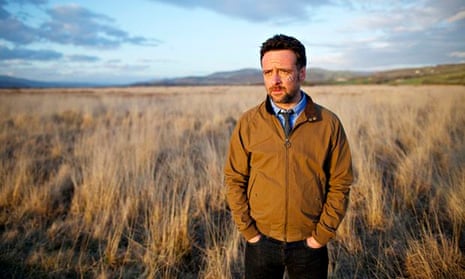At a reception in Whitehall to celebrate “an amazing year of achievements” for the Welsh TV industry, the list of successes reeled off by Stephen Crabb, secretary of state for Wales, was impressive. Exports of Y Gwyll/Hinterland, The Indian Doctor and Doctor Who, and the contribution to the busy billion-pound animation sector, all got a mention, and Crabb promised to champion this “real growth area”.
Yet there was no reference to the looming cut to BBC funding imposed by the chancellor George Osborne, and its knock-on effect for most of the 50 guests, including Welsh-language broadcaster S4C, which styles itself as the channel for Wales, and leading independent producers. A hint of the challenge came from BBC News presenter Huw Edwards, who mentioned the heavy burden of duties placed on the BBC in Wales. This is because unlike in Scotland or Northern Ireland there is a plurality problem. As outlined in Ofcom’s Public Service Broadcasting Review last month, there is no sturdy national press to unite north, mid and south Wales and commercial radio is sparse.
BBC Wales was criticised in the report by Audience Council Wales for the diminishing budget for English-language programmes made for Welsh viewers, noting it has been seven years since Gavin & Stacey and Torchwood appeared on the main BBC channels.
After his speech, Crabb - who also welcomed culture secretary John Whittingdale to the event - insisted it was very early days and said his office would be making plenty of representations on behalf of the sector.
When the last licence fee deal in 2010 handed the BBC responsibility for funding S4C, it replaced a long period of inflation-linked annual rises with a 24.4% cut. Funding currently comes from £75m paid by the BBC, bolstered by £31m of programming from BBC Wales made up of a minimum of 567 hours that includes news, some sports and the soap Pobol y Cwm. Though the BBC did not offer up S4C for a further reduction in the licence fee deal, the exchange of letters following the hurried negotiation said “the BBC’s grant to S4C may be reduced by an equivalent percentage” to the reduction made across the corporation. Whittingdale added it was “fair” S4C should face this.
Huw Jones, chairman of the S4C authority, says he was “as surprised as everyone else” by the deal, and sees this as “the first word, not the last word”. After S4C publishes its annual report on Tuesday he will be lobbying hard, reminding government that the Public Bodies Act 2011 requires the secretary of state to ensure “sufficient funding” for S4C to carry out its duties. He points to the benefit of “an independent organisation to look after the Welsh language”.
The success of bleak detective drama Hinterland has helped S4C’s recovery from a meltdown at the start of the decade and boosted its profile. It has streamlined, expanded online, has a presence on iPlayer and extensive optional English subtitling. It has cut the cost of its originated programming by 41%, reduced commissions, dropped an HD service and increased repeats. But now the squeeze on the licence fee is raising the issue of fairness all over again and there are even whispered suggestions it could reduce its hours.
Welsh speakers number 562,000 according to the latest census, around 23% of the population of 3.1 million, assisted by Welsh schooling and its official language status. Weekly reach and primetime ratings are falling, and the BBC Trust expressed concern about falling audiences in its May review. On the other hand, S4C is still used by about 35% of people in Wales and thanks to digital distribution Welsh speakers outside its borders can now watch. The dynamics have changed – some of its most-watched output is daytime events such as this week’s coverage of the Royal Welsh Show.
S4C is sensitive about ratings, but Ofcom’s PSB review points out its audience share declined over the review period from 1.3% to 1.0% in 2014. It notes that during the current BBC charter BBC Wales’s spending on English language programmes reduced by 32%.
Shadow culture secretary Chris Bryant says S4C “has done a remarkable job managing to survive” but faces a tough future. He passionately believes Welsh speakers in Wales should have a service, but adds that “the blunt truth” is that the Welsh assembly does not want responsibility for it, though the recent Silk Commission on devolving powers to Wales suggested a link. Plaid Cymru leader Leanne Wood, a non-Welsh speaker, disagrees: “It is high time for the assembly to take greater responsibility for broadcasting to secure and prioritise not just S4C but public service broadcasting in general.”
And will the government wish to provoke the comparatively sleepy (compared with Scotland) red dragon of Welsh nationalism? The Welsh Language Society ran a fierce picketing campaign after the 2010 deal, and is calling for a statutory funding formula for S4C. Its appetite for direct action reminded everyone that S4C is an effective piece of social policy engineering. But in a fight for scarcer resources its future is uncertain.

Comments (…)
Sign in or create your Guardian account to join the discussion